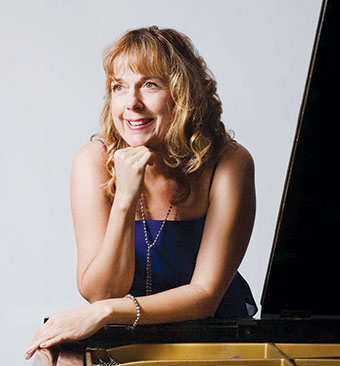Return of the Native
by Jan Jezioro

Pianist Susan Yondt celebrates Chopin and Schumann with the Friends of Vienna
A curtain call to last year’s bicentennial celebration of the 1810 births of Frédéric Chopin and Robert Schumann will take place at 3:30pm on Sunday, January 30, at the Unity Church on Delaware Avenue in Buffalo, when the Friends of Vienna welcome visiting pianist Susan Yondt, who will perform a program of their works.
A Buffalo native, Yondt studied with Frieda Manes and later at UB with Stephen Manes, before earning a master’s of music degree, cum laude, from the University of Louisville, under noted professor of piano Lee Luvisi. Living in Sweden since 1979, Yondt now performs concerts throughout Sweden and Europe. “I had met my husband, Sten, who is Swedish, in the States, where we married,” says Yondt, “and when I was finished with my master’s degree we decided to move to Sweden and see if I liked living there. Everything was completely new for me, the language, the culture, customs, Swedish music, so it was a big change.” Luckily for Buffalo audiences, Yondt often returns to Buffalo to visit her family, and she has enjoyed performing several times previously before appreciative audiences in the Friends of Vienna series.
Yondt explained the idea behind her program choices: “My program is called ‘Friends: Chopin and Schumann,’ and I will be telling the audience about their friendship, which interestingly enough, began with Schumann’s rave 1831 review of Chopin’s Op. 2, in which he wrote, ‘Hats off, gentlemen, a genius!’ Admiration was certainly part of their friendship and they both loved writing music for the piano. The fact that Robert Schumann dedicated his Kreisleriana—one of his greatest works, in my opinion—to ‘my friend Frédéric Chopin’ says it all, I think.”
The differences between the music of Chopin and Schumann are intriguing to Yondt. “Playing Chopin’s music is the height of the piano playing experience,” she says. “Absolutely delicious! Chopin composed in a whole new way for the piano, and to play a ‘Chopinesque’ legato is a requirement for every pianist. His many compositions are so varied and beautiful, and they are enough to last a whole lifetime of playing the piano. Playing Schumann’s music is a bit more complicated, just as rewarding to play as Chopin’s, but in a totally different way. The melodies are not as embellished as Chopin’s, maybe cleaner, one could say, and often I feel swept away by the power of his music. Right now I’m playing his piano quintet in Sweden, and this is fantastic music.”
Asked about the differences of performing the works of the two composers, Yondt says,“I always feel that while Chopin was influenced greatly by the Italian bel canto when he wrote his singing lines, Schumann is totally German. There is seriousness about Schumann’s music which is profound and he is also quite unpredictable, as compared to Chopin. In general, playing Chopin’s music seems more straightforward and Schumann is more complicated. Of course, it’s always hard to generalize, as both Schumann and Chopin have such a varied output of compositions.
“By eliminating the applause and break between certain pieces in my program, I want the audience to experience a kinship between the two composer’s music. When I play Schumann’s piece ‘Chopin,’ one of the movements of his work Carnaval, and then go directly into Chopin’s Polonaise-Fantasie, I want the audience to feel that Schumann is reaching out a hand to Chopin. They both are in A-flat major, and the short Schumann piece serves as an introduction to Chopin’s much longer Polonaise-Fantasie. When I play Chopin’s Berceuse and continue directly into Des Abends of Schumann, it almost sounds like the same piece, not only because both pieces are in D-flat major but because of their same atmosphere as they describe the night and a lullaby. I find it interesting to combine the two composer’s pieces in a way they perhaps didn’t think of themselves. Isn’t it fascinating that they both wrote these similar pieces in D-flat major? Maybe it isn’t just a coincidence!”
Tickets are $8 general admission, $6 for students. For more information, visit www.friendsofvienna.org.
blog comments powered by Disqus|
Issue Navigation> Issue Index > v10n3 (Week of Thursday, January 20) > Return of the Native This Week's Issue • Artvoice Daily • Artvoice TV • Events Calendar • Classifieds |









 Current Issue
Current Issue